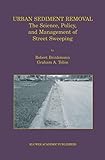Urban sediment removal: the science, policy, and management of street sweeping [Libro electrónico] / by Robert Brinkmann, Graham A. Tobin
Por: Brinkmann, Robert [autor/a].
Tobin, Graham A [autor/a].
Tipo de material: Libro
en línea Editor: Boston, Massachusetts, United States: Kluwer Academic Publishers, c2001Descripción: x, 172 páginas : ilustraciones ; 24 centímetros.ISBN: 0792374657; 9781461355922 (Print); 9781461515159 (Online).Tema(s): Street cleaningNota de acceso: Disponible para usuarios de ECOSUR con su clave de acceso Nota de bibliografía: Incluye bibliografía e índice: páginas 159-167 Número de sistema: 55306Contenidos:Mostrar
Resumen:
Libro
en línea Editor: Boston, Massachusetts, United States: Kluwer Academic Publishers, c2001Descripción: x, 172 páginas : ilustraciones ; 24 centímetros.ISBN: 0792374657; 9781461355922 (Print); 9781461515159 (Online).Tema(s): Street cleaningNota de acceso: Disponible para usuarios de ECOSUR con su clave de acceso Nota de bibliografía: Incluye bibliografía e índice: páginas 159-167 Número de sistema: 55306Contenidos:Mostrar
Resumen:| Tipo de ítem | Biblioteca actual | Colección | Signatura | Estado | Fecha de vencimiento | Código de barras |
|---|---|---|---|---|---|---|
| Libros | Biblioteca Electrónica Recursos en línea (RE) | Acervo General | Recurso digital | ECO400553064994 |
Incluye bibliografía e índice: páginas 159-167
1. The art and science of street sweeping: an introduction to urban street sweeping management.. 2. Horses to horse power: the development of street sweeping practices.. 3. Street smart innovations: technological change and the modern street sweeper.. 4. The waste pile: street sweeping and waste management.. 5. Clean streets - clean waterways: street sweeping, storm water, and pollution reduction.. 6. Roads paved with good intentions: street sweeping management practices.. 7. The road not taken: recommendations for research in street sweeping.. Index
Disponible para usuarios de ECOSUR con su clave de acceso
There is not an extensive literature on street sweeping. Much of the research that has been completed exists in the "gray" area of technical reports and government documents. Furthermore, a great deal of this research is locally based, and has not been widely published. Indeed, our review of the scientific literature, revealed that, while storm water quality has received a lot of attention, few academicians have been involved in street sweeping research per se. Thus, throughout our research into street we sweeper effectiveness, sweeping protocols, and sweeping practices, wished that there had been a book summarizing some of the important issues associated with street sweeping. As our frustration grew, we realized that we were uniquely poised to write such a book as our research had encompassed a variety of different projects including sweeper testing, waste management, and related storm water quality. Also, early on in this exercise, we recognized that there was a growing demand for information about street sweeping policies and management, especially for studies focusing on the effectiveness of different sweeping schedules, on waste management operations, and on non-point, pollution reduction practices associated with storm water runoff. It was abundantly clear that there was a profound lack of research on street sweeping that could assist with developing local, regional, or national policies. There was, in effect, little guidance for city managers on these issues. eng
Disponible en línea
Disponible en formato PDF
Subscripción a ELSEVIER de diciembre del 2013
